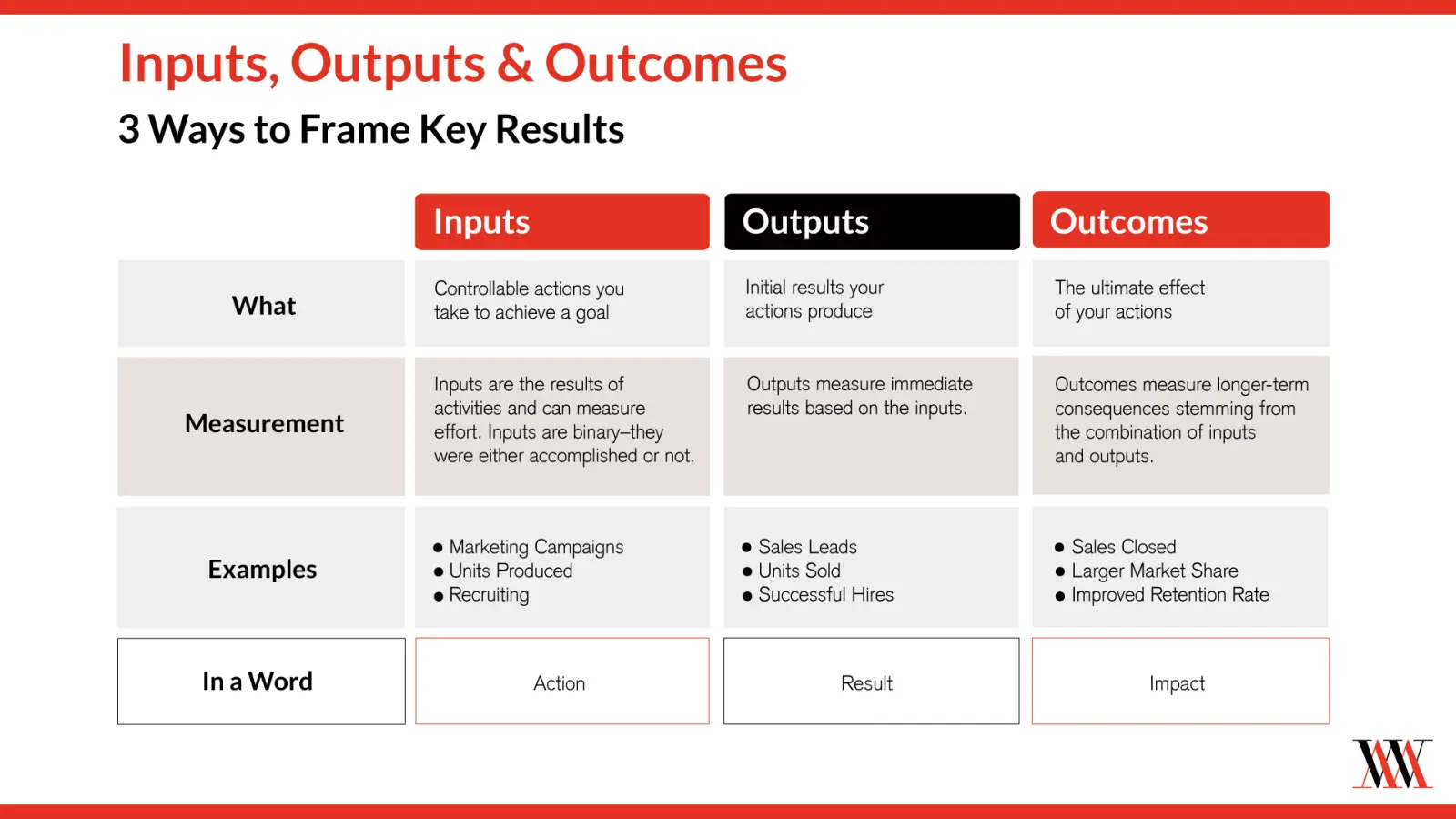For action-oriented people and teams, few things are more exciting than crossing off a new item on a to-do-list. However, it is important to keep in mind that action and progress are not always synonymous.
The Objective and Key Results (OKR) framework is a flexible goal management tool adaptable for any work culture or even personal use. OKRs provide the best blueprint to better articulate your goals and outline a roadmap to achieving them. The formula is concise — Objectives are the overarching goals a team or person would like to accomplish. Key Results are measurable (specific and time-bound) action steps towards achieving the Objective.
Although the structure is simple, OKRs have the potential to shift company or organizational culture from an activities-based mindset to an outcome-based one. But how do you write OKRs that demonstrate progress, not just activity?
While there are many methods of crafting OKRs, writing Objectives and Key Results that outline progress rather than activity will lead to incredible outcomes. In this FAQ, we are going to focus on the difference between activity and impact and the two different functions of OKRs — output Key Results and outcome-focused Objectives.
What are output Key Results and why do they matter?
Output Key Results are the identified milestones that should be met in the process of reaching the Objective. Outputs communicate the time and effort of the team towards achieving the Objective. Former Intel CEO Andy Grove and founder of the Objective and Key Results framework viewed outputs as the “measuring stick” of an OKR.
“Stressing output is the key to increasing productivity,” he wrote.
Although an output in many cases can serve as measurement, outputs don’t necessarily lead to outcomes. And in the name of productivity, it is quite easy for teams and leaders to lose sight of their overall Objective and instead, shift focus to their outputs. However, outputs must clearly communicate what will change — in other words, they must make a difference.
Outputs are not meaningful independent of describing the outcome. However, good outcome-focused Objectives help teams identify which outputs are most likely to lead to the desired outcomes. When crafted with intention and foresight, outputs can serve as a powerful engine that keeps your Objectives moving forward.
Keep the following in mind, when outlining your outputs:
- ✔ Do: Ask what needs to be done to achieve the Objective by keeping your end in mind and thinking strategically about how your outputs will impact your outcome.
- ✔ Do: Ask how your outputs are adding value and creating change within your organization.
- ✔ Do: Shift your focus from action to results.
- ❌Don’t: Outline outputs that don’t clearly define progress toward the Objective.
- ❌Don’t: Develop outputs as a to-do-list for the sake of productivity. (If they look like your job description, there’s room to rephrase your OKRs.)
What are outcome-focused Objectives and why do they matter?
While an output is what a team does, outcomes reflect the change that occurs based on what a team does. In many cases, building outcome-focused Objectives requires you to shift from an activities-based mindset to an outcome-based one.
Outcome-focused Objectives typically focus on:
- Optimizing an existing practice or product
- Building a new system
- Defining stages of development
While not all Objectives have to be outcome-focused, in many cases, an OKR will make clear what outcome will be achieved if the Key Results are achieved. Restructuring your Objectives and goals with an outcome in mind develops an additional element of focus, transparency, and alignment.
For example, Allbirds, a New Zealand-American footwear company had a top-level Objective to develop 100% carbon-emission neutral products. The outputs in place to support that Objective included tracking their emissions from the supply chain, their manufacturing, shipping, and retail operations. In the case of Allbirds, outcomes allow teams to shift their focus from progress to how progress is made.
Outcome-focused Objectives organically strengthen the feedback process
Implementing outcome-focused Objectives lays the groundwork for a productive, goal-oriented work culture that makes the feedback process less personal. With a clearly defined vision, feedback becomes a fluid process of reviewing the Objectives, assessing whether or not they were met, and evaluating why or why not—in a process called Conversations, Feedback, and Recognition, or CFRs. Outcome-focused Objectives make feedback stronger.
When a team can think through the right outcomes, they, in turn, have the ability to logically define the adjust the tactics to strategically reach them in light of what learning comes about.
Keep the following in mind, when outlining your outcome-focused Objectives:
- ✔ Do: Ask where the company/team needs to go.
- ✔ Do: Regularly review your outcome-based Objectives (CFRs).
- ❌Don’t: Confuse your outcomes with activity.

Make your movement matter
OKRs are a tool to communicate what issues are key to ambitious progress. In many cases, outputs may be indicators of progress. However, if they simply track activity, it’s time to rethink — what matters most to our success? What has to change in order to get there?
Engage others in the process of framing OKRs — maybe you come in with initiatives, but you come out of the discussion with outcomes. Or, you might decide as a team that the output is the right measure of success. Just don’t default. If more than half your KRs are outputs, it might be time to bring in the brain trust and see if you can have a conversation that clarifies and communicates the impact. That’s how teams get amazing stuff done.
Where can I get more information?
Are you or your team stuck on attainable goals or struggling with establishing shared, aspirational goals? We’d love to hear from you about them. Be sure to check out our FAQs, Resources, and Stories.
Or, if you’re looking for an OKR coach, check this out.
If you’re interested in starting our OKRs 101 course, click here.
